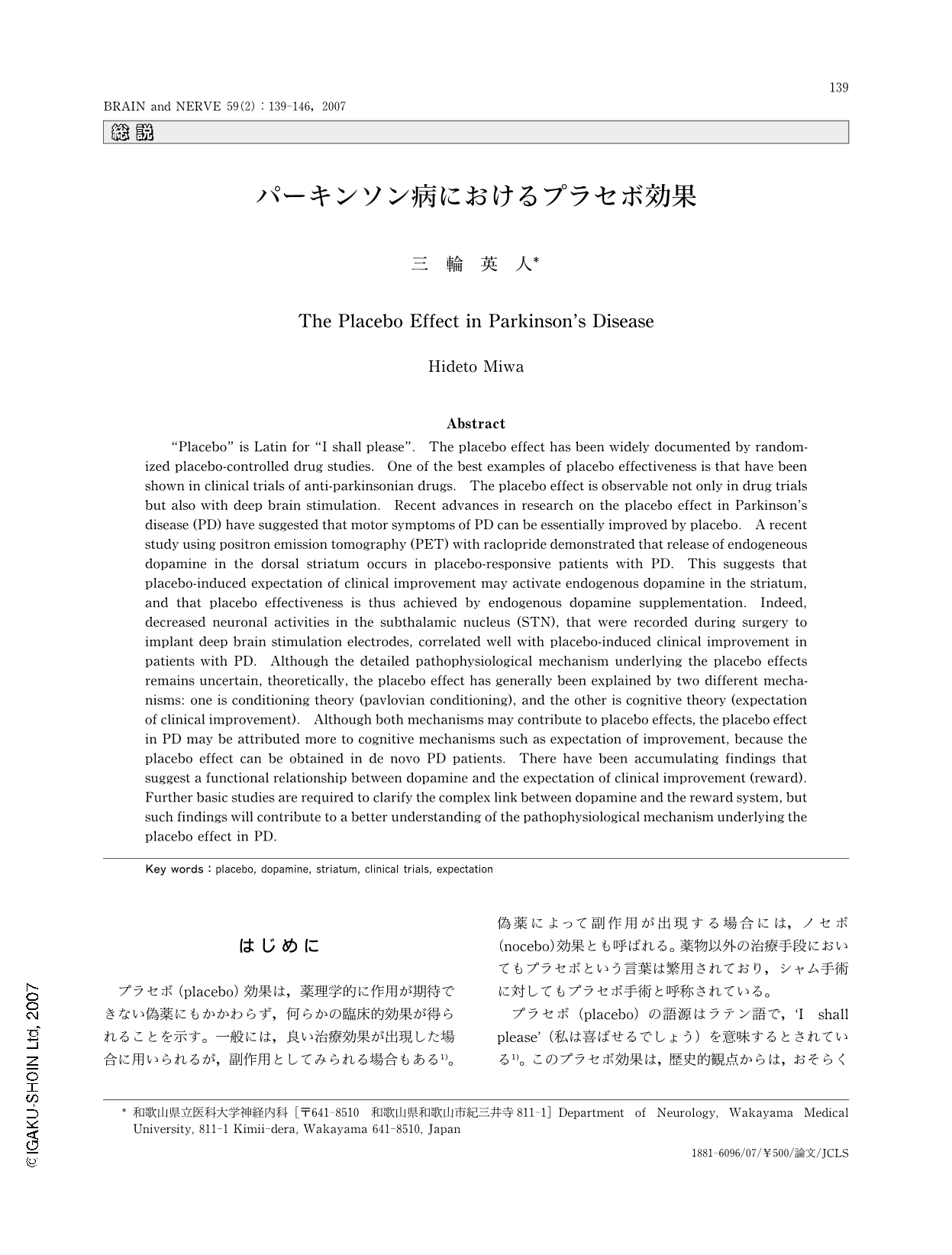11 0 0 0 OA 水素水飲水によるパーキンソン病に対する多施設共同無作為化2重盲検試験
- 著者
- 頼高 朝子 深江 治郎 渡辺 宏久 三輪 英人 志村 秀樹 河尻 澄宏 下 泰司 前田 哲也 大塚 千久美 山田 大介 富山 誠彦 阿部 隆志 平沢 基之 木原 武士 斎木 英資 鈴木 千賀子 風間 明日香 大野 欽司 伊藤 美佳子
- 出版者
- 順天堂大学
- 雑誌
- 基盤研究(C)
- 巻号頁・発行日
- 2015-04-01
水素分子はパーキンソン病(PD)疾患モデル動物のドパミン神経細胞の減少を抑制した。この事実を基にレボドパ内服中のPD患者に対して水素水を48週間飲水させた無作為化二重盲検試験でその症状を改善させた。初期及び進行例を含めたPD患者に対象拡大し72週に延長し、無作為化二重盲検並行群間試験を14施設で実施した。レボドパ未内服の患者を含めた178例を登録し、水素水群91例とプラセボ群86例に試験水を1日1l飲水した。水素水による有害事象は認めなかった。主要評価であるPD評価スケールの開始時から72週目までの変化量は水素水群とプラセボ群で統計学的な有意差は認めず、有効性は認めなかった。
3 0 0 0 パーキンソン病におけるプラセボ効果
はじめに プラセボ(placebo)効果は,薬理学的に作用が期待できない偽薬にもかかわらず,何らかの臨床的効果が得られることを示す。一般には,良い治療効果が出現した場合に用いられるが,副作用としてみられる場合もある1)。偽薬によって副作用が出現する場合には,ノセボ(nocebo)効果とも呼ばれる。薬物以外の治療手段においてもプラセボという言葉は繁用されており,シャム手術に対してもプラセボ手術と呼称されている。 プラセボ(placebo)の語源はラテン語で,‘I shall please'(私は喜ばせるでしょう)を意味するとされている1)。このプラセボ効果は,歴史的観点からは,おそらくは近代的医学の発展前には治療効果の本質であった可能性すらあるのではないだろうか。現代の日常診療の中でさえ,実際の医学的治療におけるかなりの部分を占めている可能性が高い。しかし,プラセボを治療薬の1つとして位置づけ得るかに関しては,人道的見地からも,また客観的治療効果の面からも批判がある。Hrobjartssonら(2001)の論文2)は良く知られている。プラセボが使用された100編以上の臨床試験データをレビューした結果,痛み以外の症状を改善する十分な証拠は得られなかったと述べ,新薬開発のための臨床試験以外に治療手段としての偽薬を使用することを批判している。一方で,実地臨床の場において,プラセボ効果が特に顕著であると広く実感されている疾患がある。疼痛,抑うつ,パーキンソン病である3)。本稿では,パーキンソン病におけるプラセボ効果に焦点を当て,その効果が本質的に病態を改善しているらしい臨床的知見や,プラセボ効果とドパミンに関する基礎医学的研究成果などについて述べたい。
3 0 0 0 OA 4.プラセボの効果 ―特にパーキンソン病における効果について―
- 著者
- 三輪 英人
- 出版者
- 一般社団法人 日本臨床薬理学会
- 雑誌
- 臨床薬理 (ISSN:03881601)
- 巻号頁・発行日
- vol.40, no.4, pp.145-150, 2009 (Released:2009-10-15)
- 参考文献数
- 17
The placebo effect can be observed in various medical conditions, and has been documented by randomized placebo-controlled drug studies. One of the best examples is the placebo effect in Parkinson's disease (PD). The placebo effect is observable not only in drug trials but also with surgical therapies, such as deep brain stimulation, fetal tissue transplantation, and infusion therapy of a neurotrophic factor. A recent study using positron emission tomography (PET) with raclopride demonstrated that the release of endogeneous dopamine in the dorsal striatum mediates the placebo effect in PD, suggesting that the placebo effectiveness is achieved by endogenous dopamine supplementation. Although the detailed pathophysiological mechanism underlying the placebo effect is unclear, the placebo effect has been explained by two mechanisms: the conditioning theory (pavlovian conditioning) and the cognitive or expectancy theory (expectation of clinical improvement). Speculatively, it may be that the placebo effect in PD is related more to cognitive mechanisms. Numerous studies have suggested a functional relationship between dopamine and the reward system. Understanding the placebo effect is important for designing clinical trials and interpreting their results.
